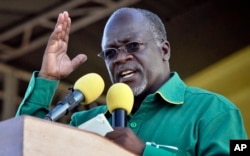Tanzania's government has been cracking down on irregularities in the mining sector, most recently confiscating diamonds worth $15 million from British company Petra Diamonds, accusing it of devaluing exports.
And in July, the government demanded gold miner Acacia pay $190 billion in what it asserted were unpaid taxes, saying the company had underreported its exports.
"They are stealing from us. It's strange, and some who were involved are our people," said Tanzanian President John Magufuli.
Chatham House Africa program research assistant Rebekka Rumpel says that Tanzania's government previously allowed international financial institutions a greater amount of input into the country's mining laws.
Now, she says, Magufuli is trying to walk them back.
"I think, you know, he is trying to reject that period of greater foreign involvement and also greater liberalization of the '90s and 2000s," Rumpel said. "And you know, it's very much framed as a kind of 'I'm on the side of ordinary Tanzanians standing up against people who would deny us our true natural wealth.'"
Tanzanian mining sector expert Fatma Karume says there was a reason past administrations liberalized the rules for the mining industry.
"Nobody wanted to invest in Tanzania, given previous nationalization exercises that we had undertaken, and therefore, for people to invest, the [Benjamin] Mkapa administration in particular, had to make it an attractive proposition," Karume said.
Aubrey Hruby, a senior fellow at the Africa Center at the Atlantic Council, says the current developments in the mining sector in Tanzania are part of a much larger trend in the Magufuli administration, which prioritizes the state as the principle generator of economic activity. But, she says, this trajectory is already having a significant impact on investment.
"I think all too often, … large investors, institutional investors who invest in the mining companies through stock exchanges, or otherwise, they see this as 'Oh, it's another reason why doing business in Africa is riddled with risk.' So, unfortunately, people tend to make this micro-experience in Tanzania part of the macro-narrative of investing in Africa," Hruby said.
Karume agrees that the government's measures have investors concerned.
"These are savvy investors. They're not uneducated people, they're savvy investors who have been banked by savvy bankers, who have lawyers working for them," she said. "They're going to put their money in a place where they think it's going to be secure. It's as simple as that."
And, she says, the government's demands are unreasonable.
"I think it's vastly exaggerated, the $190 billion tax bill, is vastly exaggerated," Karume said.
Several attempts to contact Benjamin Mchwampaka, Tanzania's commissioner for minerals, for comment were unsuccessful.
An earlier version of this story misidentified Benjamin Mchwampaka as minister for energy and minerals. VOA regrets the error.





